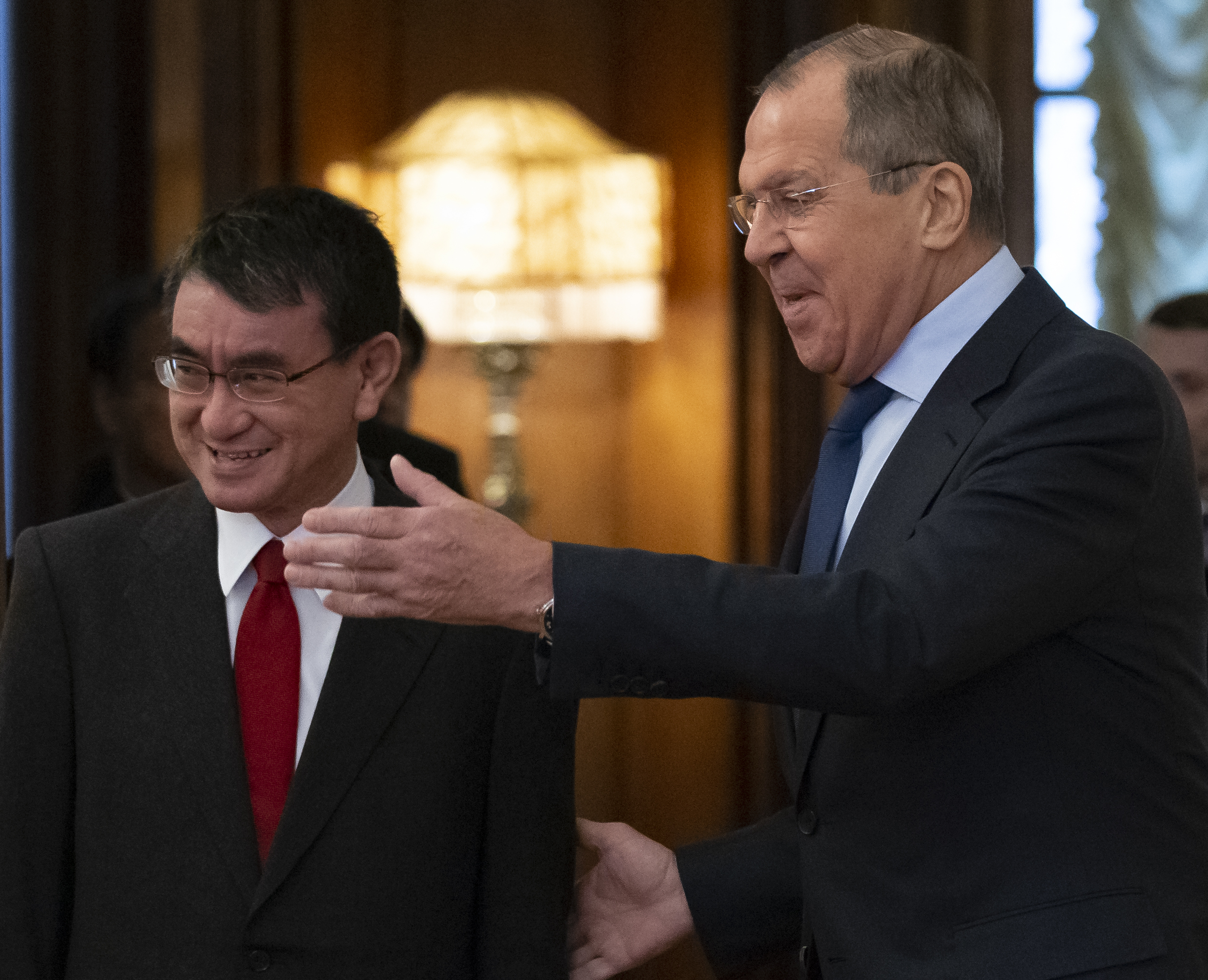
Russian, Japanese foreign ministers discuss disputed islands
MOSCOW (AP) — Russia’s top diplomat threw cold water Monday on Tokyo’s hopes for a quick return of four Pacific islands at the center of territorial dispute, warning Japan it must recognize the islands as part of Russia as a starting point for talks.
The stern statement from Foreign Minister Sergey Lavrov, which followed the talks with his Japanese counterpart Taro Kono, appeared to reflect Moscow’s efforts to temper Japanese expectations of an imminent deal on the Kuril Islands dispute.
It sets a tough stage for Japanese Prime Minister Shinzo Abe’s trip to Moscow for talks with Russian President Vladimir Putin later this month. Abe has recently voiced hope that this year will mark a breakthrough in solving the dispute and spoke about an imminent change in the islands’ status — remarks that angered Moscow.
Speaking after the talks, Lavrov said Moscow saw recent statements from Abe as unacceptable.
“Russia’s sovereignty over the islands isn’t subject to discussion. They are part of the territory of the Russian Federation,” Lavrov told reporters, noting the U.N. Charter supports Moscow’s ownership of them.
The Soviet Union took the four southernmost Kuril Islands during the final days of World War II. Japan asserts territorial rights to the islands, which it calls the Northern Territories. The dispute has kept the countries from signing a peace treaty.
Speaking at the start of the talks, Japan’s Kono said Russia and Japan needed to solve the territorial problem to set the stage for expanded economic and other ties.
Japanese Foreign Ministry spokesman Takeshi Osuga said during a separate briefing in Moscow the two ministers had a “serious and frank exchange.” He wouldn’t comment on specifics and said Russian and Japanese diplomats would continue discussions on the issue.
Putin and Abe agreed in November to accelerate negotiations based on a 1956 Soviet proposal to return two of the islands to Japan, but Lavrov’s somber tone indicated that Japanese expectations of a quick breakthrough were premature.
Abe’s optimism raised concerns in Russian nationalist circles and fueled criticism of the Kremlin. In an apparent attempt to contain the damage, the Russian Foreign Ministry summoned the Japanese ambassador to warn Tokyo not to “artificially incite the atmosphere regarding the peace treaty problem and try to enforce its own scenario of settling the issue.”
Lavrov struck a similar chord as he sat down Monday with Kono.
“Once again, I would like to ask our Japanese colleagues to strictly follow agreements by our leaders,” he said.
After their talks, the Russian diplomat said he also drew Kono’s attention to a statement by Abe’s political aide suggesting that solving the territorial dispute with Russia would help efforts by Japan and the U.S. to deter China.
Lavrov called the statement “outrageous,” adding that it raised new questions about the independence of Japanese foreign policy.
“We wondered whether Japan could be independent given such reliance on the U.S. and we were told that Japan would act proceeding from its national interests,” Lavrov said. “We would like to hope it will indeed be so.”
He said the Soviet Union proposed returning the two islands to Japan before Tokyo struck a military alliance with the U.S. in 1960.
Lavrov noted that Russia remains concerned about the U.S. military buildup in the Pacific, including the deployment of U.S. missile defense components that he said create security risks for Russia and China.
The Western Journal has not reviewed this Associated Press story prior to publication. Therefore, it may contain editorial bias or may in some other way not meet our normal editorial standards. It is provided to our readers as a service from The Western Journal.
Truth and Accuracy
We are committed to truth and accuracy in all of our journalism. Read our editorial standards.
Advertise with The Western Journal and reach millions of highly engaged readers, while supporting our work. Advertise Today.












